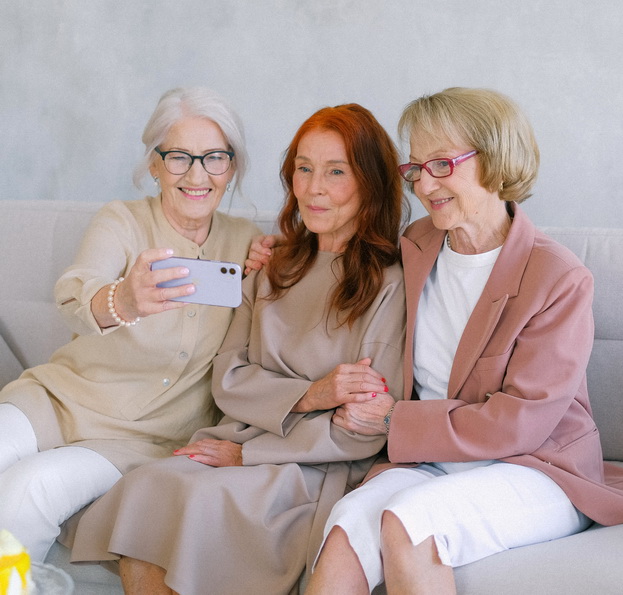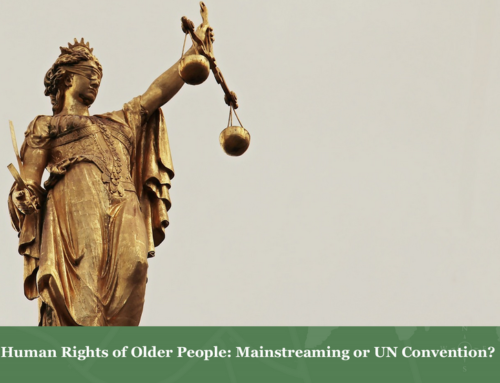When 85-year-old Charles goes for lunch with his daughter, he feels invisible. The waitress asks his daughter what he wants to eat. Charles feels frustrated and powerless as if his voice has been snatched from him, without permission. This is just a small example of what aging without voice and choice means for older persons.
Without Voice and Choice
When you can’t speak, you can’t be heard. And when you can’t ask for what you really need or want, you have no choice but to deal with what others believe you need or want. For example, without a voice, dependence on caregivers can lead to a lack of choice in everyday life – what to eat, when to bathe or go outside, where you can live, or who you hang out with. Families and organizations, sometimes, even take over decisions on medical treatment, money, or property. Everything, at best, becomes a compromise.
Why older persons become invisible is complex. Ageism, a weakened voice from physiological aging, decreased stamina, and the misguided belief that aging is the same for everyone, all play a part. Diversity of education levels, socio-economic status, and culture also factor in. And it doesn’t help that almost every aspect of dealings with government, business, healthcare, shopping, and community services are online.
The lack of voice and choice about mobility, care, technology, housing security, and income security has a profound impact on physical, mental, social, and financial wellbeing. This is a global issue in developing and developed countries. The United Nations Open-Ended Working Group on Ageing will meet from March 29 to April 1, to discuss how to strengthen the protection of the human rights of older persons.
“Nowadays my children and younger villagers don’t see my worth anymore.
They make decisions without me participating.
They can decide to sell some of my property without telling me.”
81-year-old man in Tanzania.
Freedom to Decide for Ourselves, HelpAge International
COVID Complications
While some of these issues are not new, COVID-19 has made them worse, partly by lack of access to, or knowledge of, technology.
Isolation becomes a frightful reality for older persons who live alone. Television and radio become their friends and, as a result, the risks of cognitive decline or mental illness increase.
With no access to video conferencing, the quality of doctor consultations can suffer. A telephone doctor appointment, with no visual cues, makes communication much harder when the older person has a hearing or speaking difficulty.
There are even challenges with COVID vaccinations despite the priority access. Age “unfriendly” procedures, seen during early days of vaccination in the US, mean older persons either have to either figure out how to book online appointments or accept long telephone-waiting queues. There is also no choice but to deal with long line-ups, standing and waiting, with no bathroom in sight.
Age with Voice and Choice
COVID aside much can be done, at every level, to support and empower older persons to be visible and active:
- Individual. Find voice and exercise choice. At 75, Barbara Hillary, a cancer survivor, became the first black woman and one of the oldest people, to reach the North Pole. And at 89, Arthur Rubinstein performed one of his greatest recitals in Carnegie Hall.
- Family. Empower and enable. Support older persons to advocate for their own health care. Help them to prepare for medical, legal, or other appointments and encourage them to speak for themselves. Listen more.
- Community. Nurture cross-generation connections. Promote exchanges and activities between older persons and all age groups, especially with younger people, to increase empathy, understanding, and mutual mentoring opportunities.
- Organizations. Include, inform and involve. Collaborate with older persons to determine their needs, and benefit from their collective wisdom to design the products and services for healthy and happy aging.
- Governments. Protect and reinforce the rights of older persons in equal recognition before the law, in decision-making and all aspects of the law, free from age discrimination and loss of liberty.
Check out other Age Knowble #AgeWithRights blogs and videos here.






